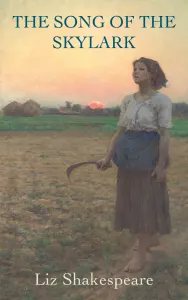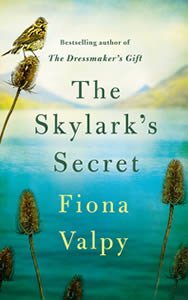-
Previous Books of the Months
May's Book Of The Month
-
Song of the Skylark- by Liz Shakespeare

For more than thirty years Liz Shakespeare has been writing books inspired by the history, the people and the landscapes of Devon. The Song of the Skylark is based on the actual experiences of a young parish apprentice sent to work on a remote Devon farm in the 1840’s. Nine-year-old Mary is fearful of her master’s volatile temper and, despite the comforting presence of her older brother Thomas, she finds the physical labour hard to bear. As the years pass, and a series of failed harvests makes life on the farm intolerable, the brother and sister take daring action in an effort to change the course of their lives.
£9.99 from Liz Shakespeare's website (signed copies for Mirthy audience)
Questions to think about
-
Q1. 'The Song of the Skylark’ includes original newspaper articles and documents. How did the knowledge that this was a true story affect the way you responded to the book?
Q2. The story depicts a time when children were treated very differently to today. Why might children have been viewed differently at that time?
Q3. Which character did you like best?
Q4. It was Bartholomew Fulford who arranged for the children to go to the farm. Should he be blamed for their suffering?
April's Book Of The Month
-
The Skylark’s Secret - by Fiona Valpy

Loch Ewe, 1940. When gamekeeper’s daughter Flora’s remote highland village finds itself the base for the Royal Navy’s Arctic convoys, life in her close-knit community changes forever. In defiance of his disapproving father, the laird’s son falls in love with Flora, and as tensions build in their disrupted home, any chance of their happiness seems doomed. Decades later, Flora’s daughter, singer Lexie Gordon, is forced to return to the village and to the tiny cottage where she grew up. Having long ago escaped to the bright lights of the West End, London still never truly felt like home. Now back, with a daughter of her own, Lexie learns that her mother—and the hostile-seeming village itself—have long been hiding secrets that make her question everything she thought she knew.
£4.99 from Amazon
Questions to think about
-
Q1. At the beginning of the book, Lexie moves from London to Loch Ewe, the tiny community where she grew up. Have you ever moved from being one of a crowd in the city to a well-known local in a small village or town? How did you find that transition? What did you find challenging about it?
Q2. What strikes you about the novel's setting on Loch Ewe in the far north-west of Scotland? How does the setting change (or not change) between the different time periods? How does the natural world shape the narrative?
Q3. What does music symbolise in the story? Did you notice any other symbolism in the book?
Q4. "It takes a village to raise a child." Was this true for Lexie? And do you think the same applied in Daisy's case too?